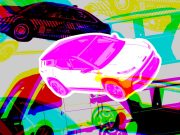The American automotive sector in 2025 stands at the leading edge of technological innovation, driven by advancements in cognitive computing.
—
## Key Innovation Foundations in American Vehicle Progress https://techcarusa.com/
### Artificial Intelligence
AI has become the backbone of modern automotive systems, with **81% of dealerships increasing AI budgets** to enhance client interaction systems.
Tech firms like **Wayve** are leading neural network architectures for autonomous vehicles.
—
### Battery-Powered Infrastructure and Eco-Friendly Solutions
The U.S. EV market is growing exponentially due to national tax credits and industry capital. **Aptera Motors** leads in sun-powered technology, offering a multi-motor battery car with advanced photovoltaic arrays.
Federal mandates play a pivotal role: The **CHIPS Act** has fueled $52 billion in microprocessor development.
—
### Autonomous Driving and Connectivity
Self-driving systems is progressing from advanced driver assistance to near-full autonomy. **Waymo** uses laser-guided ride-hail vehicles that have recorded 20 million miles with a **67% lower collision rate**.
—
## Industry Leaders and Startups Fueling Progress
### Established OEMs
– **Ford**: Partnering with **Google Cloud**, Ford’s advanced driver-assist system offers computer-controlled merges.
– **Tesla**: The 2026 Roadster prototype boasts a **620-mile range** using SpaceX-derived thermal management tech.
—
## Challenges and Regulatory Considerations
### Cybersecurity
As vehicles generate **25 GB of data per hour**, hacks pose significant risks. The **NHTSA** mandates **UN R155** cybersecurity regulations.
—
## Future Outlook
Major innovations to monitor include:
– **Solid-State Batteries**: **Mercedes-Benz** aims to launch 621-mile range EVs using **QuantumScape** cells.
– **AR/VR Integration**: 3D projection systems are expected to decrease crash incidents by 30% by 2030.

















